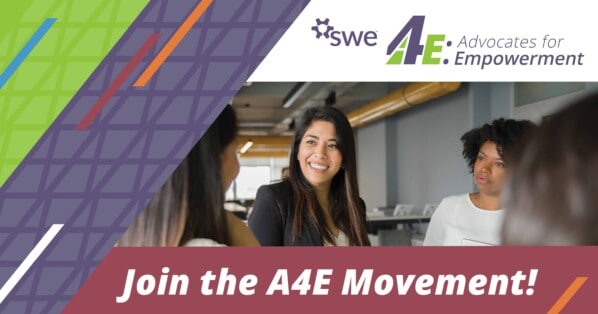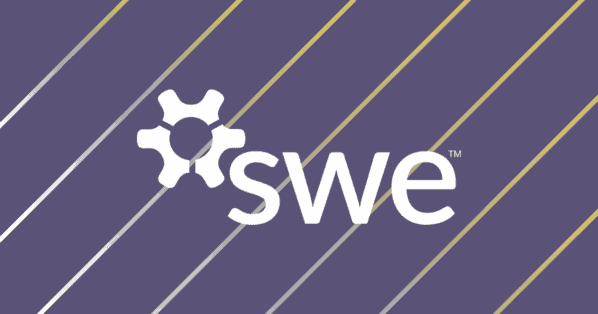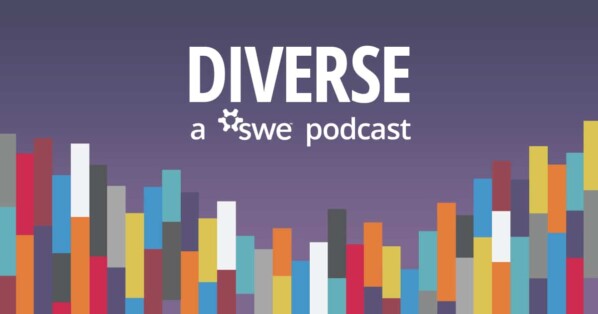SWE Stories: Tales from the Archives- Mentoring Pt. 2
Listen to the archived podcast or read the transcript below, then make sure to share it with your colleagues and friends! Be sure to check out our other archives podcasts, as well.
Anne Perusek:
Welcome to SWE Stories, Tales From the Archives. I’m Anne Perusek, director of editorial and publications for the Society of Women Engineers.
Troy Eller English:
And I’m Troy Eller English, SWE’s archivist. SWE has been thinking a lot about mentorship recently. In our last episode, we shared SWE members’ memories of their college mentors. Today, we’d like to explore how mentors have impacted the careers of SWE members.
In the conversations that we’ve had with more than 80 SWE members in oral history interviews, we’ve heard wonderful stories about the ways professional mentors have instilled confidence in women engineers and propelled them in their careers.
Perusek:
But we’ve also heard stories from members who didn’t find those mentors, who had to forge a career path on their own. During a SWE Grassroots Oral History Project interview at the WE13 Annual Conference, Fellow and Distinguished Service Award recipient Anita Gale talked about the lonely professional road she traveled after receiving a master’s degree in aeronautical engineering from the University of Washington in 1974. The following clip has been edited for length.
Anita Gale oral history excerpt
Gale: Interestingly enough, I didn’t have a mentor. And it may be, I’ve wondered—even at work, I never really had a mentor. And maybe—I don’t know if I effuse this aura of incredible competence, I don’t need—but it would be nice. But I don’t ask because I’m stupid. I don’t ask. On the other hand, to survive going through engineering at that time, I had to be fiercely independent. I had to be ready to be completely, entirely, totally self-sufficient, regardless of what happened. It was come hell or high water, God willing the creek don’t rise, even if God willing or God ain’t willing, I’m going to do it. Just fiercely independent and determined, had to be. Really thick skin to survive it.[…]
I had no mentors, no advice. I’m basically going it alone. And I think the reason that no one stepped up to be a mentor is—part of it, we were just working our tails off on the space shuttle in the early days. But part of it is it was probably considered risky to mentor the girl. They just—they didn’t know what to do with a girl. I came in with this fantastic resume, and that’s what got me hired, but I was still a girl.
Eller English:
Other early SWE members had to look outside engineering to find mentors. Dr. Irene Peden, a SWE Fellow and recipient of the Achievement Award, became the first female engineering faculty member at the University of Washington in 1962. She recalled her career and its dearth of professional mentors during a 2002 SWE oral history interview. The following excerpt has been edited for length.
Irene Peden oral history excerpt:
Peden: And I had been made aware — the law librarian at the UW was a friend. She was a much older woman than I was at that time. But she was quite unique in her own field. When I first came to the university there was a lot of publicity about it. And she made a point of contacting me and taking me to lunch, you know. And she was sort of a campus wise counselor for me, even though the fields were different. Being a law librarian was probably not so different in a certain way from what I was trying to do. And she had impressed on me the importance of giving back as part of the responsibility that we have. And I believe that. […] And it was a two-way street, and both sides of that were important.
Perusek:
Luckily, not all members experienced this lonely road. In the 1950s, Dorothy Morris, a Fellow and recipient of the Society’s Distinguished Service Award, moved from being an administrative assistant into a decades-long engineering career by her boss and mentor, Charles Colvin. She talked about his support during a 2003 Profiles of SWE Pioneers Oral History Project interview with former SWE archivist Lauren Kata.
Dorothy Morris oral history excerpt:
Morris: So this older man started a company called Colvin Laboratories. And he hired me to run the office so he could be involved in building the company and the engineering and the manufacturing. Charles Colvin was the most unique individual I have ever met. He did not see black or white in a person, he did not see male or female. And it was a matter of months when I would come to him and say — ask him for a decision and his response became, “What would you do?” And I told him, and typically he said, “Well, why don’t you do it?”
And he got me involved in the manufacturing. And he decided that besides running the office and so on that I had managerial talents, and he wanted me to take over running the manufacturing part of the company.
Kata: How did you feel about that when he made that offer?
Morris: Scared to death. And I thought this was impossible. But I went to NYU [New York University]. I took courses in mechanical engineering. And with his support and his complete confidence, I mean, I went ahead, and I became manufacturing manager of Colvin Laboratories. And eventually, everything reported to me. I became general manager of Colvin Laboratories [in 1958]. And so this is how I entered the engineering world.
Eller English:
Professional mentors can help women engineers hone their technical and analytical skills, although SWE Fellow Dr. Gloria Brooks Reinish noted a hazard of idolizing her mentor during a 2003 SWE oral history interview.
Gloria Brooks Reinish oral history excerpt:
Reinish: When the war ended, they went back to doing telephone work, and I went on to Sperry Gyroscope Company, which was out on Long Island. That was a really good move for me. I made more money, and also I discovered something. My boss there was competent, but he wasn’t as brilliant as my boss had been at Bell Labs. And I discovered that I could figure things out almost as well as he could.
When I was at Bell Labs I had this feeling that my boss knew everything, and I didn’t — I would just go and ask him. Any time I was puzzled about something, I would just ask him and he would come up with a wonderful explanation for it. I’d say, “Why is it doing this?” And he’d say, “Well—,” and he’d give me a wonderful theory. And then he would go on and say, “But if that’s true, then if we make this change, it should do this.” And so we would try that, and it didn’t, it would do just the opposite. And he would immediately be able to come up with an equally good theory for why it was doing the opposite. And I was just bowled over by all of this. I mean, this was my first job. I was nineteen years old. And I just almost — well, I was sort of in awe of him. He went on to be the leader of the Telstar Project. He was really very, very sharp. So it sort of gave me a bit of an inferiority complex. [laughs] Although, I guess he could say he was a mentor. I mean, he was quite good. But I was a little over-awed by him.
But then when I went to Sperry, as I said, my boss was competent, but he wasn’t overwhelmingly so. I mean, I could think of things that he didn’t think of, so I began to get a little more confidence in myself.
Perusek:
That sense of awe you can get from a professional mentor can lead you to great things. In a 2012 SWE Grassroots Oral History Project interview, Dr. Beth Holloway recalled how a mentor that she met in the Women in Engineering Program while a freshman at Purdue University moved her career in directions she never would have imagined, including being hired as the director of the program in 2001, following a decade in industry..
Beth Holloway oral history excerpt:
Holloway: So I had met someone—through the Women in Engineering Program [at Purdue]—had met someone from Cummins. It was my freshman year, and she was one of those folks where you just look up to her and you go, Oh, I would love to be her someday. She’s so—I mean, she has everything. It seems like she’s got it all together. She’s got this great career, and she has this family, and she does these cool things, and she’s very poised and—. She just seemed like that. I wanted to be like her. And we kept in contact over the years. And when I was looking for an internship after my fourth year and before my very last semester, I had contacted her and I asked her if there was any possibilities of me working at Cummins, which was the company that she worked for. Because, again, I didn’t really know what I wanted to do. I just wanted a job, and I knew I didn’t want to work at the electric company again. And she said, “Well, I don’t know. Let me see.” And it ended up I was invited down for an interview and I got an internship position.
Perusek:
With help from her mentor, Holloway received an internship at Cummins, and after she graduated she was hired by the company. She eventually led the company’s recruiting and mentoring efforts at Purdue.
Beth Holloway oral history excerpt:
Holloway: The Purdue SWE section had an industrial advisory board, and still does to this day. And one of our Cummins folks—my mentor, the reason I went to Cummins in the first place—she was on that advisory board, and she started bringing me along to those board meetings. And it was a lot of fun working with the students. It was a bit of an extension of working with the new engineers, only they were just a little bit removed from that. And I had a lot of fun. They had a lot of energy and it was so exciting.
And I remember the last board meeting I went to, turned out—as a corporate person—they, the students, had made an announcement that the director of Women in Engineering Program had retired. And they passed out a job description and they said, If you know anyone at your company who might be interested in a position like this, here’s the job description and this is what you do to apply. And so I looked and the job description and it just looked like a lot of fun. It was about mentoring people and encouraging women to be engineers and—. It was a little more than that, but that’s what I read into it. And I thought, Oh, God. That would be a dream job. That’s so much fun. And at Purdue, no less, my alma mater.
Eller English:
And of course, many members have looked to SWE to find mentors, and to become mentors themselves. Fellow and Entrepreneur Award recipient Pam Dingman mused about the support and advice she received from her SWE friends during a 2017 SWE Grassroots Oral History Project interview.
Pam Dingman oral history excerpt:
Dingman: A lot of mentoring that—you build a network. And I think the thing that’s awesome is, you might think that what you have going on is extraordinary and has never happened to anybody else, but you can always come back to SWE and find other people to give you advice. I don’t think there’s probably been a lot of SWE elected officials—elected officials who are county engineers is kind of a new area. But I have always drawn my professional support—whether it be for being an entrepreneur, or a young mother, or now as I’m an empty nester—from the many relationships I’ve had at SWE.
And it’s interesting to now have relationships that have lasted twenty-five years. I mean, here we are in Austin at the conference, and I now realize that I’ve shared a room with a fellow SWE member—I’ve split a hotel room for probably over fifteen years. And how incredible is that, to have that friendship and that bond to where you can call that person up anytime and they don’t even live in the same city you do. And so, that’s really the bonus of SWE is building that. And the network actually has grown over the years, because it used to just be building a national network. But now it’s actually building an international network and knowing people outside of the United States, even, who are engineers and are doing different things. And that depth of professional network and support is just so awesome and so supportive. And I think what’s interesting to me is SWE supported me, and I’ve supported SWE. And so, I just really appreciate—I feel that everything I’ve put into it, I’ve gotten back tenfold.
Perusek:
We hope these SWE members’ reflections on mentoring have inspired you to reach out and to reach back to help someone through their career. On behalf of myself, Troy, and everyone else at SWE, thanks for listening.
Related Content:
- SWE Stories: Tales from the Archives- Mentoring Pt. 1
- SWE Stories, Tales from the Founders’ Families
- Podcast: The Benefits of Mentorship with Cathy Meyn
Author
-

SWE Blog provides up-to-date information and news about the Society and how our members are making a difference every day. You’ll find stories about SWE members, engineering, technology, and other STEM-related topics.





